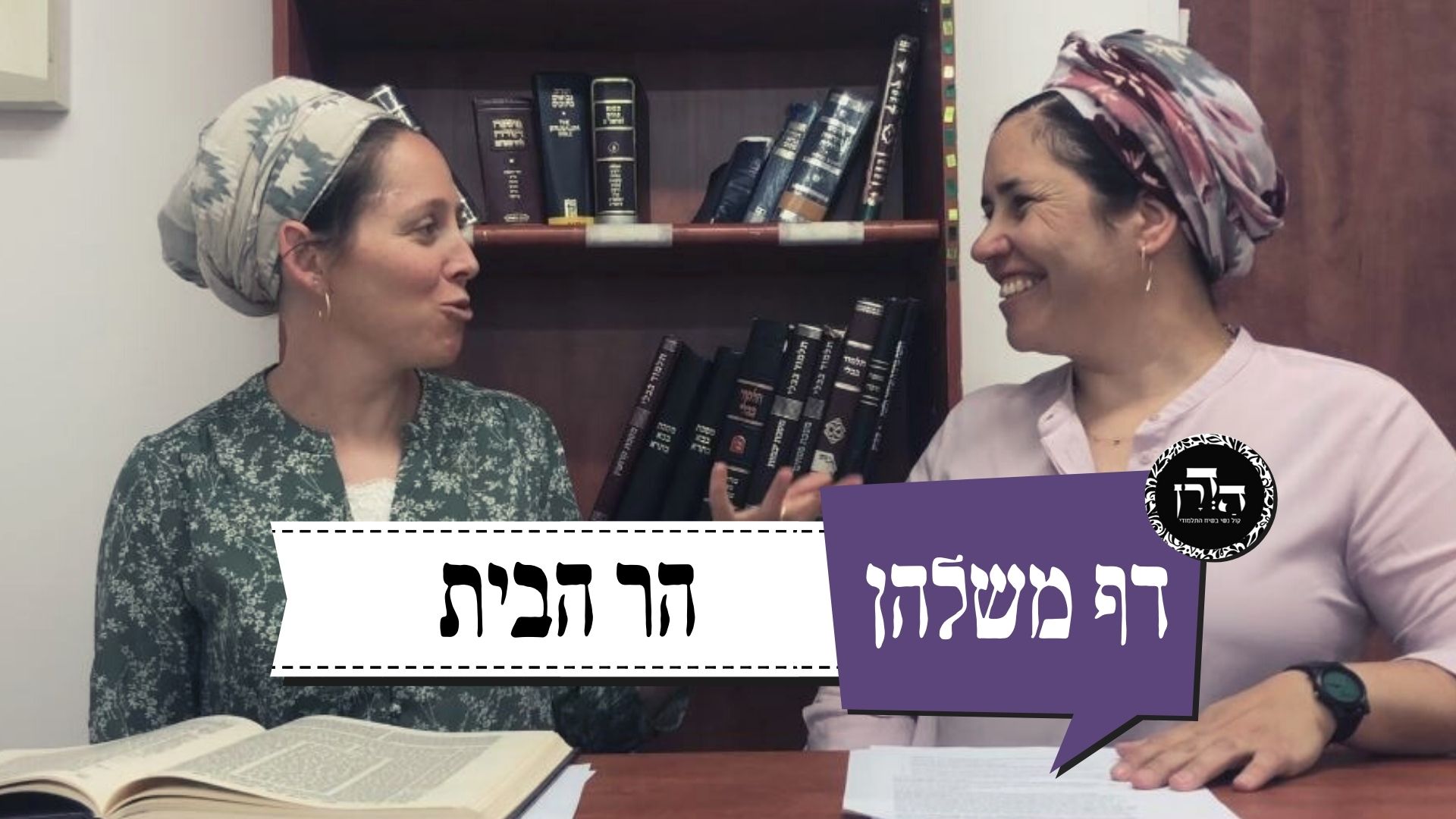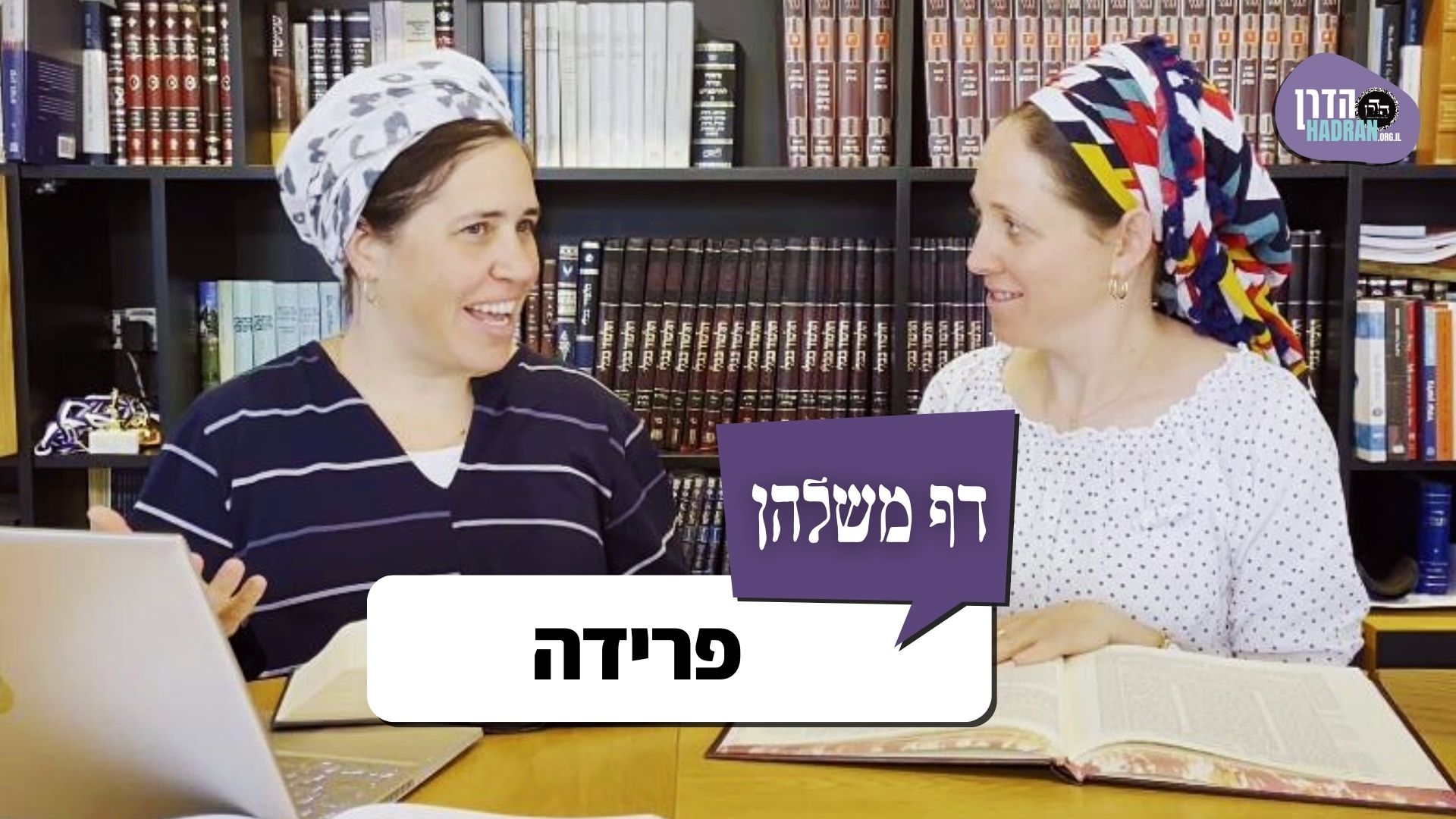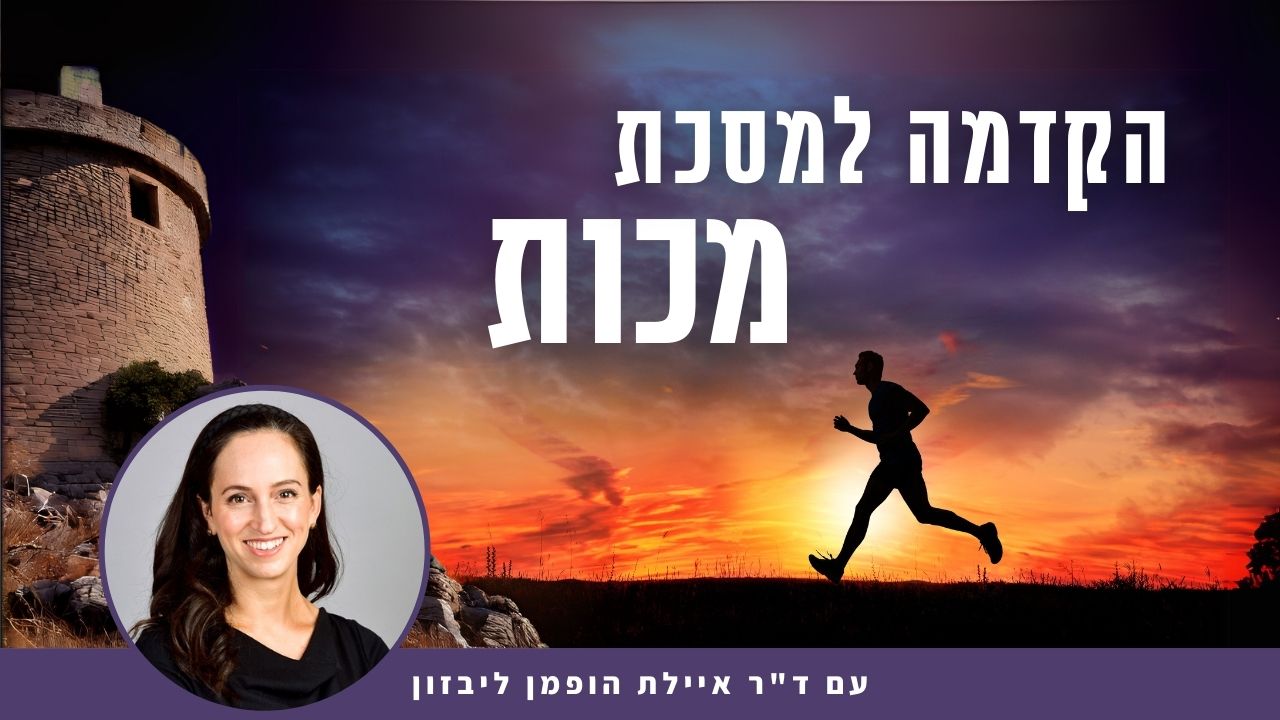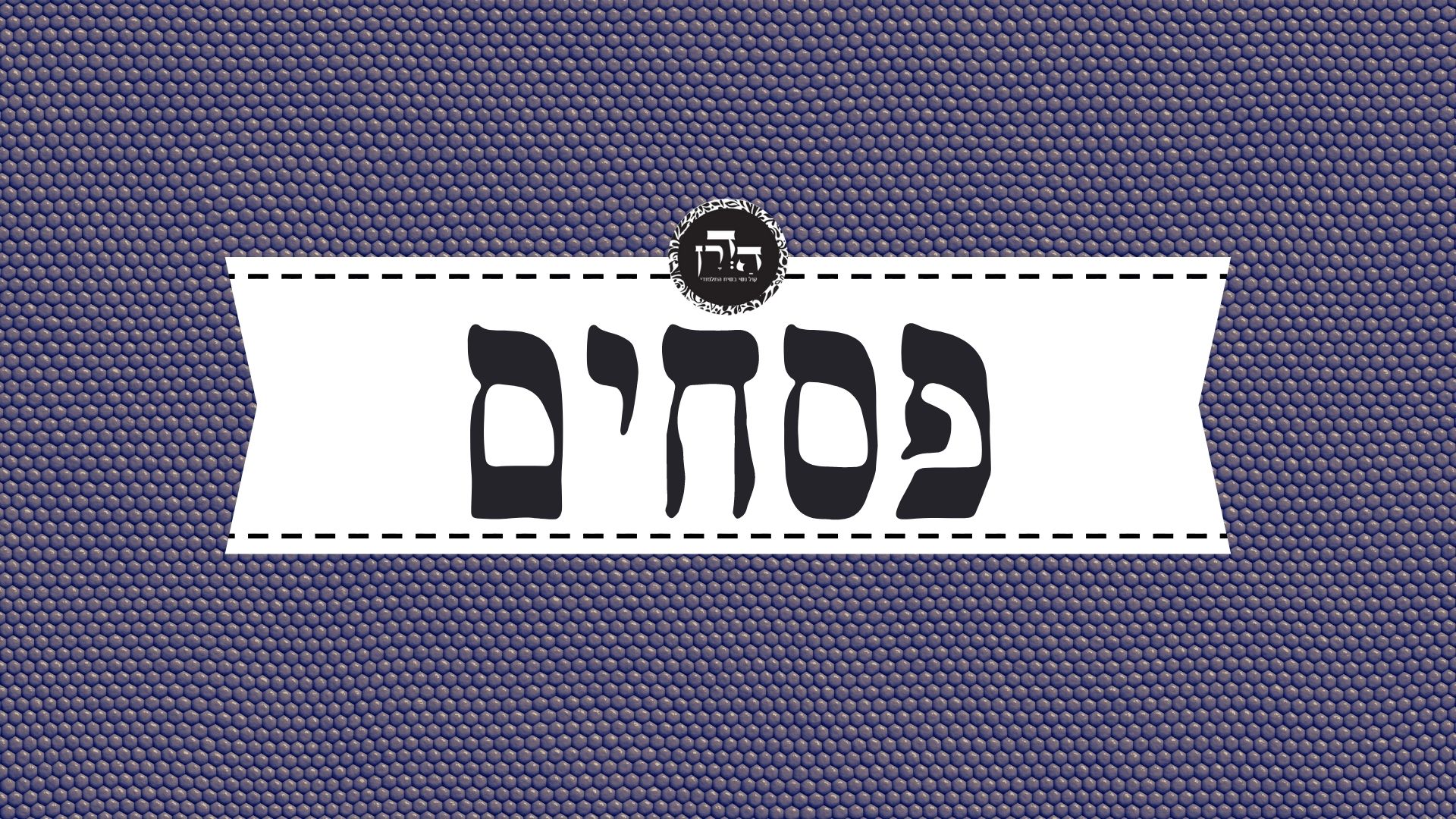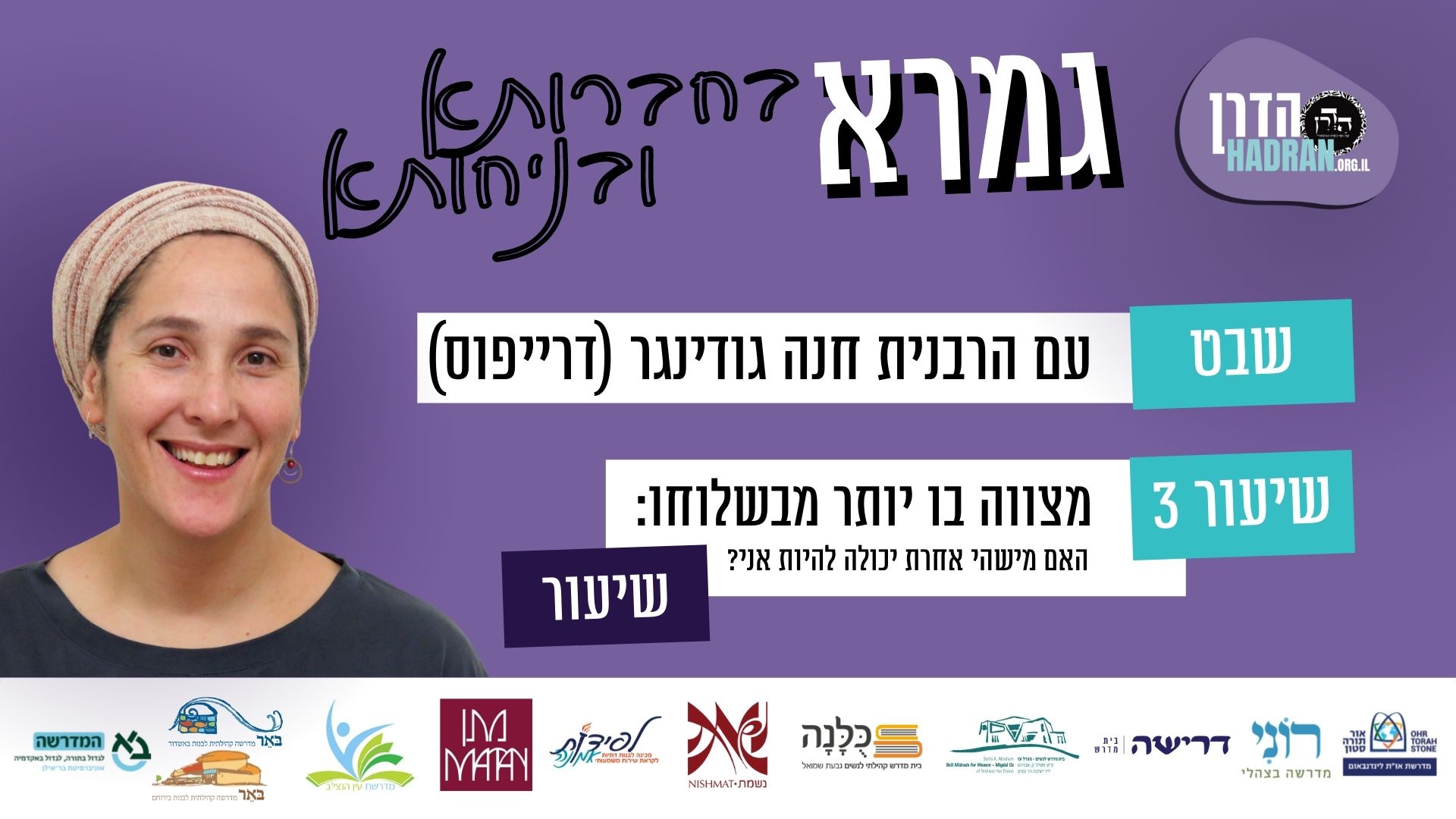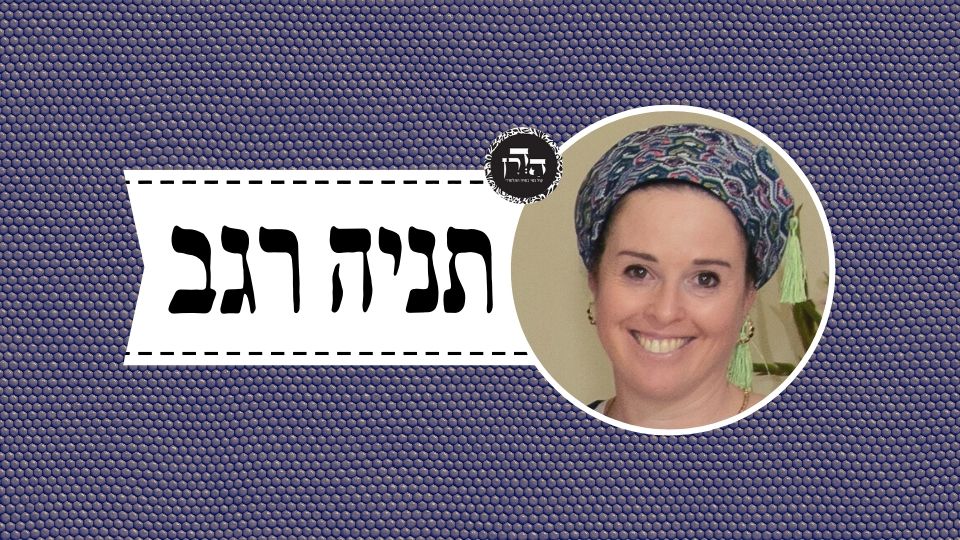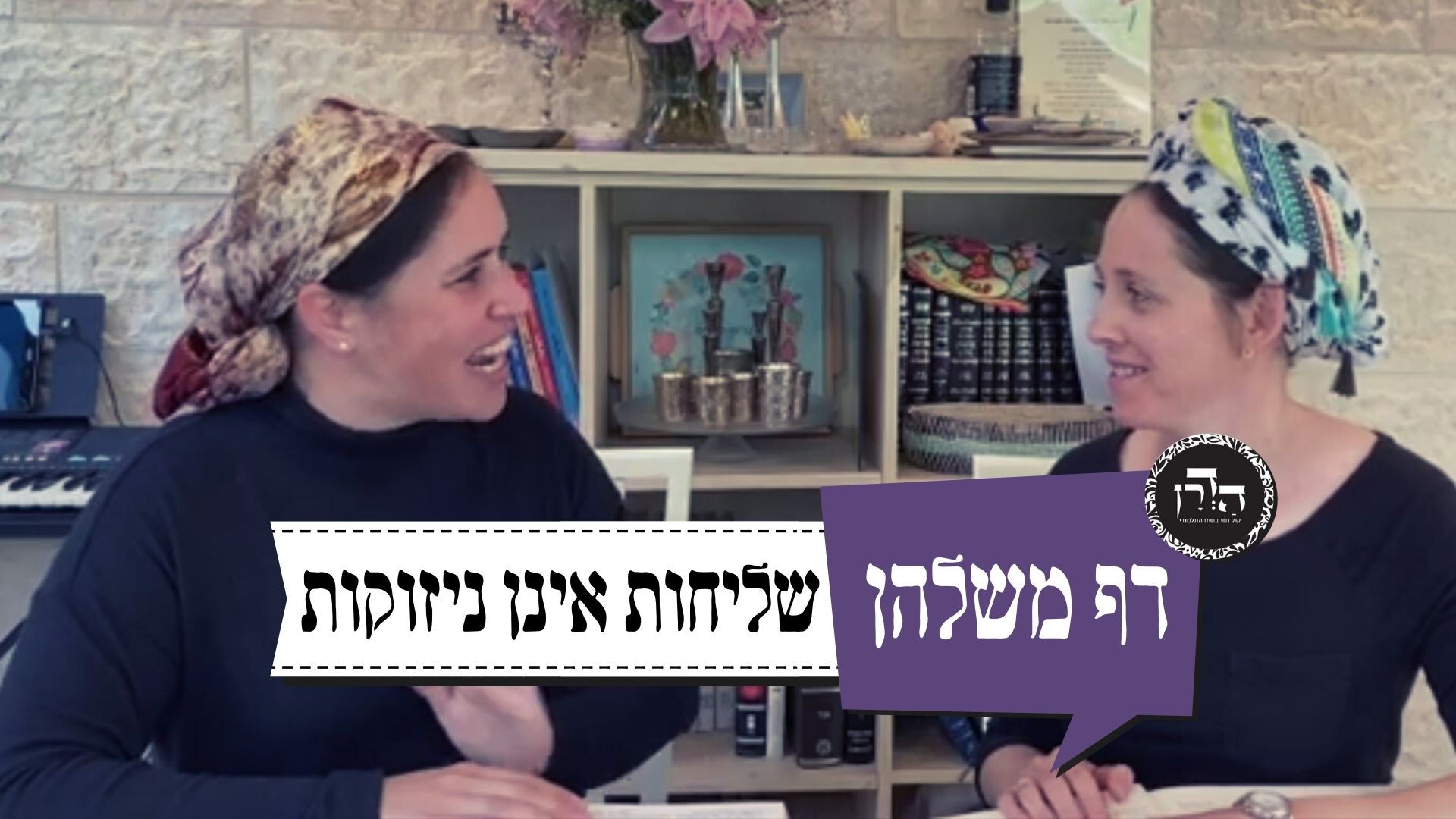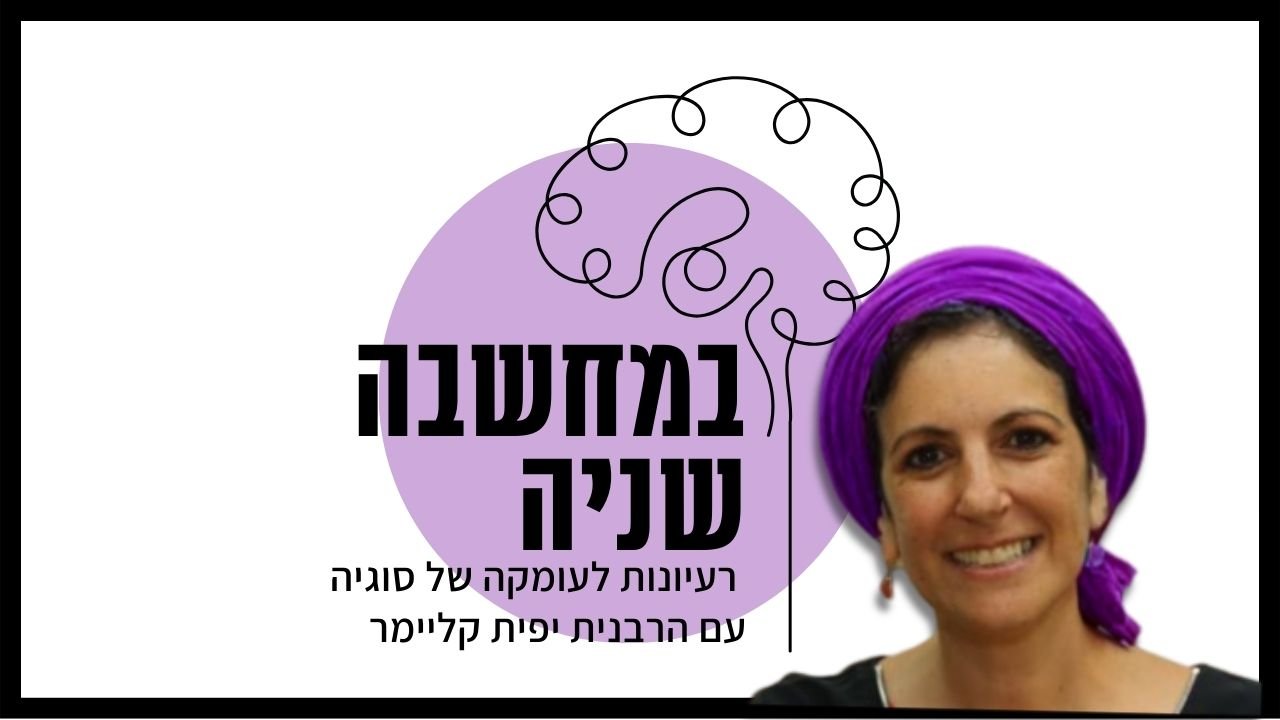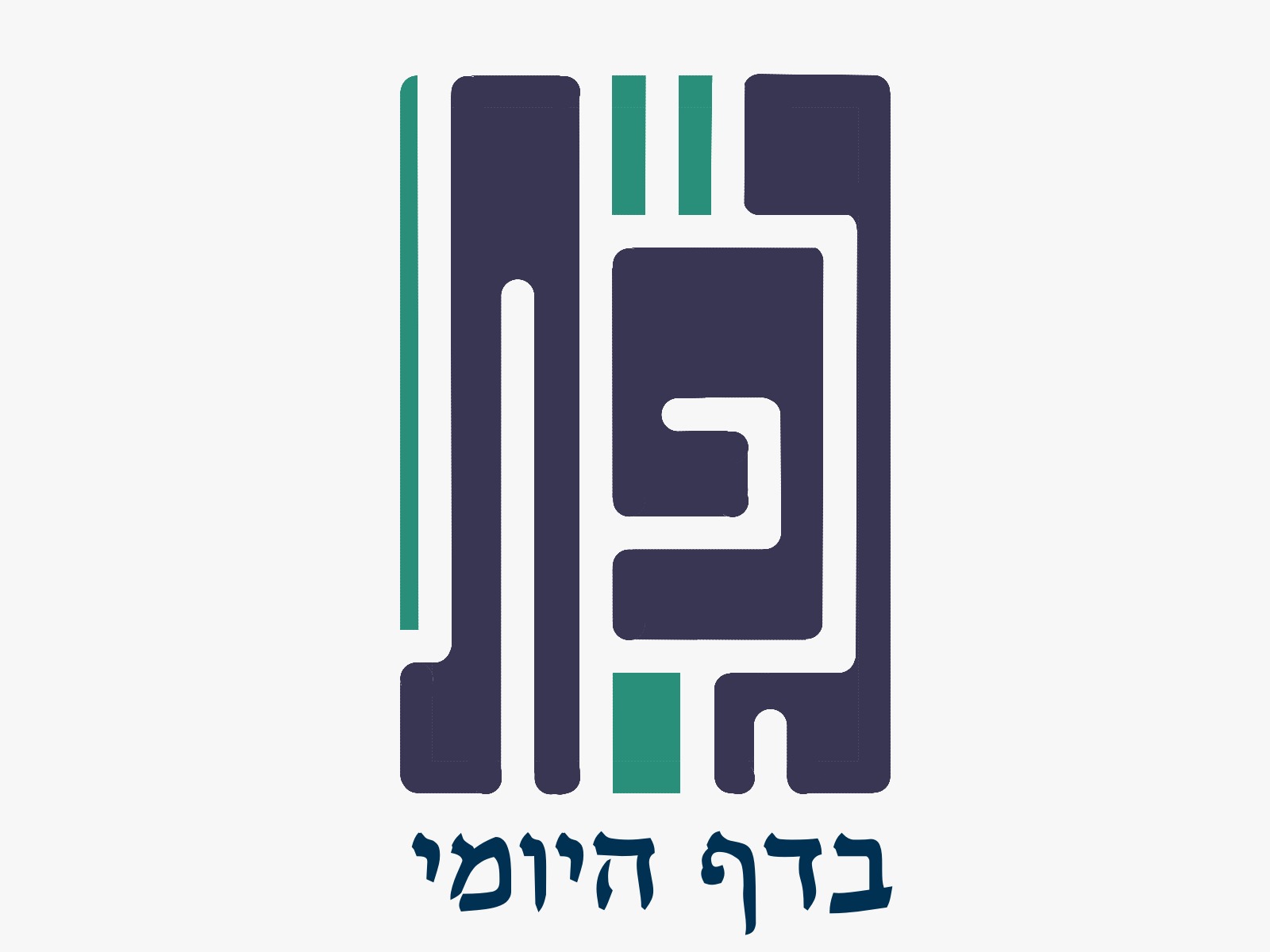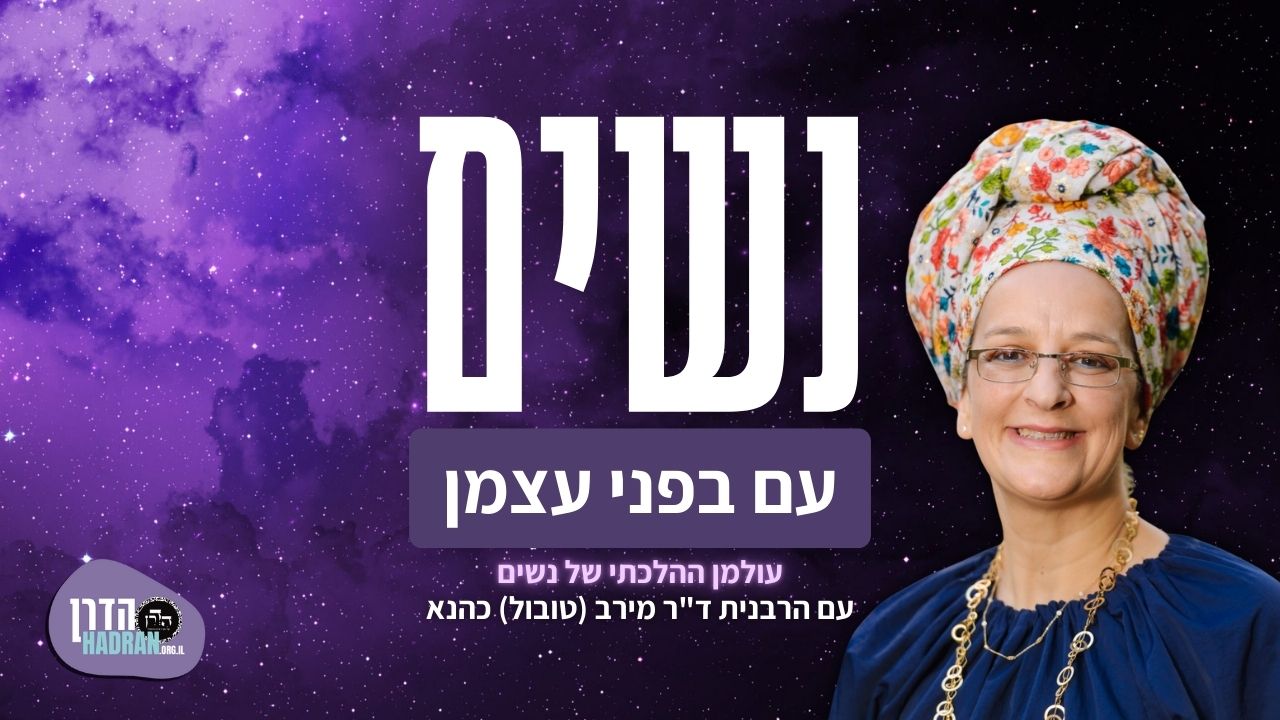הגמרא ממשיכה להביא כל מיני משניות ששם מופיע המילה "הכל” ולפרש מה זה כולל? בתוכם, מביאים מסבירים שנשים חייבות במקרא מגילה. אחר כך הגמרא מביאים הרבה מקורות תנאיים ששם רשום "הכל חייבים ב… כהנים לויים וישראלים” ומפרשים מה החידוש בזה – ולמה לא היה פשוט שכהנים לויים וישראלים היו חייבים במצוה הזו.
הלימוד השבוע מוקדש לזכות ולשלום הַיְימׇנוֹט אֱמוּנָה בַּת באנצ’י (קָסָאוּ) בת 11 שנעלמה במקום מגוריה בצפת, לפני שנתיים, ביום ט”ז אדר תשפ”ד (25.2.24), ולא נודעו עקבותיה.
רוצה להקדיש שיעור?

כלים
הלימוד השבוע מוקדש לזכות ולשלום הַיְימׇנוֹט אֱמוּנָה בַּת באנצ’י (קָסָאוּ) בת 11 שנעלמה במקום מגוריה בצפת, לפני שנתיים, ביום ט”ז אדר תשפ”ד (25.2.24), ולא נודעו עקבותיה.
כלים
העמקה
רוצה להבין מה באמת קורה מתחת לפני השטח של הסוגיה?
שיעורים, פודקאסטים והרחבות של מיטב המורות שלנו יפתחו לך עוד זוויות וכיווני חשיבה.
חדשה בלימוד הגמרא?
זה הדף הראשון שלך? איזו התרגשות עצומה! יש לנו בדיוק את התכנים והכלים שיעזרו לך לעשות את הצעדים הראשונים ללמידה בקצב וברמה שלך, כך תוכלי להרגיש בנוח גם בתוך הסוגיות המורכבות ומאתגרות.
פסיפס הלומדות שלנו
גלי את קהילת הלומדות שלנו, מגוון נשים, רקעים וסיפורים. כולן חלק מתנועה ומסע מרגש ועוצמתי.
ערכין ג
מַאי? לְאֵתוֹיֵי נָשִׁים, וְכִדְרַבִּי יְהוֹשֻׁעַ בֶּן לֵוִי, דְּאָמַר רַבִּי יְהוֹשֻׁעַ בֶּן לֵוִי: נָשִׁים חַיָּיבוֹת בְּמִקְרָא מְגִילָּה, שֶׁאַף הֵן הָיוּ בְּאוֹתוֹ הַנֵּס.
what? The Gemara answers: They serve to add women, and this is in accordance with the opinion of Rabbi Yehoshua ben Levi. As Rabbi Yehoshua ben Levi says: Women are obligated in the mitzva of reading the Megilla, as they too were participants in that miracle.
״הַכֹּל חַיָּיבִין בְּזִימּוּן״ — לְאֵתוֹיֵי מַאי? לְאֵתוֹיֵי נָשִׁים וַעֲבָדִים, דְּתַנְיָא: נָשִׁים מְזַמְּנוֹת לְעַצְמָן, וַעֲבָדִים מְזַמְּנִין לְעַצְמָן.
The Gemara asks: What is added by the ruling of the baraita: Everyone is obligated to form a zimmun and recite Grace after Meals as a group? The Gemara answers: The baraita serves to add women and slaves. As it is taught in a baraita: Women form a zimmun for themselves and slaves form a zimmun for themselves.
״הַכֹּל מִצְטָרְפִין לְזִימּוּן״ — לְאֵתוֹיֵי מַאי? לְאֵתוֹיֵי קָטָן הַיּוֹדֵעַ לְמִי מְבָרְכִין, דְּאָמַר רַב נַחְמָן: יוֹדֵעַ לְמִי מְבָרְכִין — מְזַמְּנִין עָלָיו.
The Gemara further inquires: What is added by the baraita: Everyone is included in a zimmun? This serves to add a minor who knows to Whom one recites a blessing. As Rav Naḥman says: A minor who knows to Whom one recites a blessing is included in a zimmun.
״הַכֹּל מִטַּמְּאִין בְּזִיבָה״ — לְאֵתוֹיֵי מַאי? לְאֵתוֹיֵי תִּינוֹק בֶּן יוֹמוֹ, דְּתַנְיָא: ״אִישׁ״ — מָה תַּלְמוּד לוֹמַר ״אִישׁ אִישׁ״? לְרַבּוֹת תִּינוֹק בֶּן יוֹם אֶחָד שֶׁמְטַמֵּא בְּזִיבָה, דִּבְרֵי רַבִּי יְהוּדָה.
§ The Gemara asks: What is added by the clause in the mishna (Zavim 2:1): Everyone becomes impure by means of a gonorrhea-like discharge [ziva]? This serves to add that even a day-old baby who has such a discharge becomes impure. As it is taught in a baraita: It would have been sufficient for the verse to state: A man. Why does the verse state: “When any man has an issue out of his flesh, his issue is impure” (Leviticus 15:2)? This serves to include a day-old baby who has such a discharge, to teach that even he becomes impure as one who experiences ziva. This is the statement of Rabbi Yehuda.
רַבִּי יִשְׁמָעֵאל בְּנוֹ שֶׁל רַבִּי יוֹחָנָן בֶּן בְּרוֹקָה אוֹמֵר: אֵינוֹ צָרִיךְ, הֲרֵי הוּא אוֹמֵר: ״וְהַזָּב אֶת זוֹבוֹ לַזָּכָר וְלַנְּקֵבָה״, ״לַזָּכָר״ — כֹּל שֶׁהוּא זָכָר, בֵּין קָטָן בֵּין גָּדוֹל, ״לַנְּקֵבָה״ — כֹּל שֶׁהִיא נְקֵבָה, בֵּין קְטַנָּה בֵּין גְּדוֹלָה. אִם כֵּן, מָה תַּלְמוּד לוֹמַר ״אִישׁ אִישׁ״? דִּבְּרָה תוֹרָה כִלְשׁוֹן בְּנֵי אָדָם.
Rabbi Yishmael, son of Rabbi Yoḥanan ben Beroka, says that this amplification is not necessary, as the verse states: “And of them that have an issue, whether it be a male or a female” (Leviticus 15:33). “A male” includes anyone who is male, whether a small child or an adult; “a female” includes anyone who is female, whether a small child or an adult. If so, why does the verse state: “Any man”? The Torah spoke in the language of men, i.e., this is a normal way to phrase the sentence, and therefore one should not derive a halakha from the extra word.
״הַכֹּל מִטַּמְּאִין בִּטְמֵא מֵת״ — לְאֵתוֹיֵי מַאי? לְאֵתוֹיֵי קָטָן; סָלְקָא דַּעְתָּךְ אָמֵינָא: ״אִישׁ אֲשֶׁר יִטְמָא וְלֹא יִתְחַטָּא״ — ״אִישׁ״ אִין, קָטָן לָא, קָא מַשְׁמַע לַן: ״וְעַל הַנְּפָשׁוֹת אֲשֶׁר הָיוּ שָׁם״.
The Gemara asks: What is added by the baraita: Everyone becomes impure with impurity imparted by a corpse? The baraita teaches it to add a minor. The Gemara elaborates: It might enter your mind to say that since the verse states: “But the man that shall be impure and shall not purify himself” (Numbers 19:20), one should derive from here that a man, i.e., an adult, yes, he becomes impure, but a minor does not. Therefore, the verse teaches us in the context of purification with purification water from impurity imparted by a corpse: “And sprinkle it upon the tent, and upon all the vessels, and upon the persons that were there” (Numbers 19:18). This indicates that all persons who were there became impure, regardless of age.
אֶלָּא, ״אִישׁ״ לְמַעוֹטֵי מַאי? לְמַעוֹטֵי קָטָן מִכָּרֵת.
The Gemara asks: But if so, what does the term “the man” serve to exclude? The Gemara answers: It serves to exclude a minor from excision from the World-to-Come [karet], which is mentioned in that verse: “That soul shall be cut off from the midst of the assembly, because he has defiled the Sanctuary of the Lord” (Numbers 19:20). In other words, the term “the man” serves to teach that if a minor becomes impure and then enters the Temple, he is not liable to receive karet.
״הַכֹּל מִטַּמְּאִין בִּנְגָעִים״ — לְאֵתוֹיֵי מַאי? לְאֵתוֹיֵי קָטָן. סָלְקָא דַּעְתָּךְ אָמֵינָא: ״אִישׁ צָרוּעַ״ כְּתִיב — אִישׁ אִין, קָטָן לָא, קָא מַשְׁמַע לַן.
The Gemara further asks: What is added by the ruling of the mishna (Nega’im 3:1): Everyone becomes impure by means of leprous marks? The Gemara answers: This serves to add a minor. As it might enter your mind to say that since it is written in the verse: “He is a leprous man, he is impure” (Leviticus 13:44), this is teaching that a man, i.e., an adult, yes, he does become impure, but a minor does not. Therefore, the tanna teaches us that a minor becomes impure by means of leprous marks.
וְאֵימָא הָכִי נָמֵי! אָדָם ״כִּי יִהְיֶה בְעוֹר בְּשָׂרוֹ״, מִכׇּל מָקוֹם.
The Gemara asks: But why not say that the halakha is indeed so, that a minor does not become impure by means of leprous marks? The Gemara answers that the verse states: “When a person shall have in the skin of his flesh” (Leviticus 13:2), to include all people, in any case, irrespective of age.
וְאֶלָּא ״אִישׁ״ לְמָה לִי? לְכִדְתַנְיָא: ״אִישׁ״ — אֵין לִי אֶלָּא אִישׁ, אִשָּׁה מִנַּיִן? כְּשֶׁהוּא אוֹמֵר ״וְהַצָּרוּעַ״ — הֲרֵי כָּאן שְׁנַיִם.
The Gemara asks: But in that case, why do I need the term: “He is a leprous man” (Leviticus 13:44)? The Gemara answers: It comes for that which is taught in a baraita: From the phrase “he is a leprous man” I have derived only a leprous man. From where is it derived that leprous marks also render a woman impure? When the subsequent verse states: “And the leper in whom the affliction is” (Leviticus 13:45), there are two individuals indicated here, male and female, as this verse did not need to restate: “And the leper,” since the subject of this clause was clear from the previous verse.
אִם כֵּן, מָה תַּלְמוּד לוֹמַר ״אִישׁ״? לָעִנְיָן שֶׁל מַטָּה — אִישׁ פּוֹרֵעַ וּפוֹרֵם, וְאֵין הָאִשָּׁה פּוֹרַעַת וּפוֹרֶמֶת.
If so, what is the meaning when the verse states: “A leprous man”? This is referring to the matter of the leper rending his clothes and letting his hair grow wild, which is stated in the verse below: “His clothes shall be rent, and the hair of his head shall go loose” (Leviticus 13:45). The verse therefore teaches that a man who is a leper lets his hair grow and rends his garments, but a woman who is a leper does not let her hair grow and does not rend her garments.
״הַכֹּל רוֹאִין אֶת הַנְּגָעִים״, ״הַכֹּל כְּשֵׁרִין לִרְאוֹת אֶת הַנְּגָעִים״ — לְאֵתוֹיֵי מַאי? לְאֵתוֹיֵי שֶׁאֵינוֹ בָּקִי בָּהֶן וּבִשְׁמוֹתֵיהֶן.
The Gemara asks: What is added by the ruling of the baraita: Everyone may inspect leprous marks in order to declare them pure or impure, and the clause of another baraita: Everyone is fit to inspect leprous marks in order to declare them pure or impure. The Gemara answers: These statements serve to add a priest who is not expert in distinguishing between them, the different types of leprous marks, and in identifying their names.
וְהָאָמַר מַר: אֵינוֹ בָּקִי בָּהֶן וּבִשְׁמוֹתֵיהֶן — אֵינוֹ רוֹאֶה אֶת הַנְּגָעִים! אָמַר רָבִינָא: לָא קַשְׁיָא, הָא דְּמַסְבְּרִי לֵיהּ וְסָבַר, הָא דְּמַסְבְּרִי לֵיהּ וְלָא סָבַר.
The Gemara asks: But didn’t the Master say that any priest who is not expert in distinguishing between them and in identifying their names is not authorized to inspect the leprous marks and make a decision with regard to them? Ravina said: This is not difficult. This statement, that the priest is fit, is referring to a situation where if they explain to him he understands; whereas that statement, that he is not fit, is referring to a case where even if they explain to him he still does not understand.
״הַכֹּל כְּשֵׁרִין לְקַדֵּשׁ״ — לְאֵתוֹיֵי מַאי? לְרַבִּי יְהוּדָה לְאֵתוֹיֵי קָטָן, וּלְרַבָּנַן לְאֵתוֹיֵי אִשָּׁה. דִּתְנַן: הַכֹּל כְּשֵׁרִין לְקַדֵּשׁ, חוּץ מֵחֵרֵשׁ שׁוֹטֶה וְקָטָן; רַבִּי יְהוּדָה מַכְשִׁיר בְּקָטָן, וּפוֹסֵל בְּאִשָּׁה וּבְאַנְדְּרוֹגִינוֹס.
§ The Gemara asks: What is added by the statement of the mishna (Para 5:4): Everyone is fit to sanctify the ashes of the red heifer, i.e., to pour the water over them? The Gemara answers that according to Rabbi Yehuda the statement serves to add a minor, and according to the Rabbis, who disqualify a minor, it serves to add a woman. As we learned in a mishna (Para 5:4): Everyone is fit to sanctify the ashes of the red heifer except for a deaf-mute, an imbecile, and a minor. Rabbi Yehuda deems a minor fit, but deems a woman and a hermaphrodite, who has both male and female characteristics, unfit.
״הַכֹּל כְּשֵׁירִין לְהַזּוֹת״ — לְאֵתוֹיֵי מַאי? לְאֵתוֹיֵי עָרֵל, וְכִדְרַבִּי אֶלְעָזָר, דְּאָמַר רַבִּי אֶלְעָזָר: עָרֵל שֶׁהִזָּה — הַזָּאָתוֹ כְּשֵׁרָה.
The Gemara asks: What is added by the statement of the mishna (Para 12:10): Everyone is qualified to sprinkle the purification waters on one who is ritually impure with impurity imparted by a corpse? The Gemara answers that this serves to add one who is uncircumcised. And this is in accordance with the opinion of Rabbi Elazar, as Rabbi Elazar says: If one who is uncircumcised sprinkled the purification water, his sprinkling is valid.
״הַכֹּל שׁוֹחֲטִין״ — לְאֵתוֹיֵי מַאי? חֲדָא לְאֵתוֹיֵי כּוּתִי, וַחֲדָא לְאֵתוֹיֵי יִשְׂרָאֵל מְשׁוּמָּד.
The Gemara asks: What is added by the ruling of the mishna (Ḥullin 2a, 15b): Everyone slaughters? The Gemara explains that the mishna teaches this once to add a Samaritan who slaughters, i.e., his slaughter is valid. And the one other mention of this serves to add a Jew who is an apostate [meshummad].
״הַכֹּל מַעֲלִין לְאֶרֶץ יִשְׂרָאֵל״ — לְאֵתוֹיֵי מַאי?
The Gemara further asks: What is added by the statement of the mishna (Ketubot 110b): Everyone can force others to ascend to Eretz Yisrael, i.e., one can compel his family and household to immigrate to Eretz Yisrael?
לְאֵתוֹיֵי עֲבָדִים, וּלְמַאן דְּתָנֵי עֲבָדִים בְּהֶדְיָא, לְאֵתוֹיֵי מַאי? לְאֵתוֹיֵי מִנָּוֶה הַיָּפָה לְנָוֶה הָרָעָה.
The Gemara answers: The mishna teaches this clause to add slaves. If a slave wishes to ascend to Eretz Yisrael, he can force his master to either ascend with him, or to sell him to someone who will ascend, or to free him. The Gemara asks: And according to the one who teaches slaves explicitly in the mishna, what does this phrase serve to add? The Gemara answers that it serves to add the case of one who wishes to compel his family to move from a pleasant residence outside of Eretz Yisrael to a noxious residence in Eretz Yisrael.
״וְאֵין הַכֹּל מוֹצִיאִין״ — לְאֵתוֹיֵי עֶבֶד שֶׁבָּרַח מֵחוּצָה לָאָרֶץ לָאָרֶץ.
The Gemara adds that when that same mishna teaches, in its continuation: But all may not remove others from Eretz Yisrael, this serves to add the case of a slave who fled from outside of Eretz Yisrael to Eretz Yisrael. The master may not bring him back to outside of Eretz Yisrael.
״הַכֹּל מַעֲלִין לִירוּשָׁלַיִם״ — לְאֵתוֹיֵי מִנָּוֶה הַיָּפָה לְנָוֶה הָרָעָה, ״וְאֵין הַכֹּל מוֹצִיאִין״ — לְאֵתוֹיֵי מַאי? לְאֵתוֹיֵי מִנָּוֶה הָרָעָה לְנָוֶה הַיָּפָה.
The Gemara discusses another statement of that same mishna: All can force their family to ascend to Jerusalem. This serves to add the halakha that one may compel his family to move from a pleasant residence outside of Jerusalem to a noxious residence in Jerusalem. The Gemara asks: What is added by the next clause of that mishna: And none can remove them from Jerusalem? The Gemara explains that this serves to add that one cannot compel his family to leave Jerusalem, even from a noxious residence in Jerusalem to a pleasant residence elsewhere in Eretz Yisrael.
הַכֹּל חַיָּיבִין בְּסוּכָּה, כֹּהֲנִים לְוִיִּם וְיִשְׂרְאֵלִים. פְּשִׁיטָא! אִי הָנֵי לָא מִחַיְּיבִי, מַאן מִיחַיְּיבִי?
§ The Gemara discusses several other cases where a mishna or baraita states that everyone is obligated in a particular mitzva. A baraita teaches: Everyone is obligated in the mitzva of sukka, including priests, Levites, and Israelites. The Gemara asks: Isn’t that obvious? If these people are not obligated to perform the mitzva, then who is obligated to perform it?
כֹּהֲנִים אִיצְטְרִיכָא לֵיהּ, סָלְקָא דַּעְתָּךְ אָמֵינָא: הוֹאִיל וּכְתִיב ״בַּסֻּכּוֹת תֵּשְׁבוּ״, וְאָמַר מָר ״תֵּשְׁבוּ שִׁבְעַת יָמִים״ כְּעֵין תָּדוּרוּ, מָה דִּירָה — אִישׁ וְאִשְׁתּוֹ, אַף סוּכָּה — אִישׁ וְאִשְׁתּוֹ, וְהָנֵי כֹּהֲנִים הוֹאִיל וּבְנֵי עֲבוֹדָה נִינְהוּ — לָא לִיחַיְּיבוּ.
The Gemara answers: It was necessary for the halakha to mention that priests are obligated to fulfill this mitzva, as it might enter your mind to say that since it is written: “In sukkot shall you reside seven days” (Leviticus 23:42), one can argue as follows: The Master said that this teaches: Reside seven days as you dwell in your permanent home: Just as in the case of dwelling, a man and his wife typically reside together, so too, the mitzva of sukka must be performed by a man and his wife residing together. And with regard to these priests, since they are occupied with the Temple service during the Festival and are not free to dwell in the sukka together with their wives, perhaps they should not be obligated in the mitzva of sukka.
קָא מַשְׁמַע לַן: נְהִי דִּפְטִירִי בִּשְׁעַת עֲבוֹדָה, בְּלֹא שְׁעַת עֲבוֹדָה חַיּוֹבֵי מִיחַיְּיבִי, מִידֵּי דְּהָוֵה אַהוֹלְכֵי דְרָכִים, דְּאָמַר מָר: הוֹלְכֵי דְרָכִים בַּיּוֹם פְּטוּרִין מִן הַסּוּכָּה בַּיּוֹם, וְחַיָּיבִים בַּלַּיְלָה.
Therefore, the baraita teaches us that this is not so, as although priests are exempt at the time of the Temple service, when it is not the time of Temple service they are obligated, just as is the halakha with regard to travelers. As the Master said in a baraita: Travelers who are on the move during the day are exempt from the mitzva of sukka during the day but are obligated at night, as they are not traveling at that time.
הַכֹּל חַיָּיבִין בְּצִיצִית, כֹּהֲנִים לְוִיִּם וְיִשְׂרְאֵלִים. פְּשִׁיטָא!
§ The Gemara cites a similar baraita: Everyone is obligated in the mitzva of ritual fringes, including priests, Levites, and Israelites. The Gemara asks again: Isn’t that obvious?
כֹּהֲנִים אִיצְטְרִיךְ לֵיהּ, סָלְקָא דַּעְתָּךְ אָמֵינָא: הוֹאִיל וּכְתִיב ״לֹא תִלְבַּשׁ שַׁעַטְנֵז… גְּדִלִים תַּעֲשֶׂה לָּךְ״, מַאן דְּלָא אִישְׁתְּרִי כִּלְאַיִם לְגַבֵּיהּ בִּלְבִישָׁה הוּא דִּמְחַיַּיב בְּמִצְוַת צִיצִית, וְהָנֵי כֹּהֲנִים, הוֹאִיל וְאִישְׁתְּרִי כִּלְאַיִם לְגַבַּיְיהוּ, לָא לִחַיְּיבוּ.
The Gemara answers: It was necessary for the baraita to mention that priests are obligated to fulfill this mitzva, as it may enter your mind to say as follows: Since it is written: “You shall not wear diverse kinds, wool and linen together. You shall prepare yourself twisted cords upon the four corners of your covering” (Deuteronomy 22:11–12), it is only one who is not permitted to wear diverse kinds who is obligated in the mitzva of ritual fringes. But with regard to these priests, since diverse kinds are permitted for them when they perform the Temple service, as the belt of the priestly vestments contains diverse kinds, they should not be obligated in the mitzva of ritual fringes.
קָא מַשְׁמַע לַן: נְהִי דְּאִישְׁתְּרִי בְּעִידָּן עֲבוֹדָה, בְּלָא עִידָּן עֲבוֹדָה לָא אִישְׁתְּרִי.
Therefore, the baraita teaches us that although priests are permitted to wear diverse kinds at the time when they perform the Temple service, when it is not the time of the Temple service they are not permitted to wear diverse kinds. Consequently, they are obligated in ritual fringes, as they do not have an absolute dispensation from the prohibition of diverse kinds.
הַכֹּל חַיָּיבִין בִּתְפִילִּין, כֹּהֲנִים לְוִיִּם וְיִשְׂרְאֵלִים. פְּשִׁיטָא! כֹּהֲנִים אִיצְטְרִיךְ לֵיהּ, סָלְקָא דַּעְתָּךְ אָמֵינָא: הוֹאִיל וּכְתִיב ״וּקְשַׁרְתָּם לְאוֹת עַל יָדֶךָ וְהָיוּ לְטֹטָפֹת בֵּין עֵינֶךָ״, כׇּל דְּאִיתֵיהּ בְּמִצְוָה דְיָד אִיתֵיהּ בְּמִצְוָה דְרֹאשׁ.
§ The Gemara cites another baraita: Everyone is obligated in the mitzva of phylacteries, including priests, Levites, and Israelites. The Gemara again asks: Isn’t that obvious? The Gemara answers that it was necessary to say that priests are obligated to fulfill this mitzva, as it might enter your mind to say that since it is written: “And you shall bind them for a sign upon your hand, and they shall be for frontlets between your eyes” (Deuteronomy 6:8), perhaps this juxtaposition teaches that anyone included in the mitzva of the phylacteries of the arm is also included in the mitzva of the phylacteries of the head.
וְהָנֵי כֹּהֲנִים, הוֹאִיל וְלֵיתַנְהוּ בְּמִצְוָה דְיָד, דִּכְתִיב ״יִלְבַּשׁ עַל בְּשָׂרוֹ״, שֶׁלֹּא יְהֵא דָּבָר חוֹצֵץ בֵּינוֹ וּבֵין בְּשָׂרוֹ, אֵימָא בְּמִצְוָה דְרֹאשׁ נָמֵי לָא לִיחַיְּיבוּ.
And in the case of these priests, since they are not included in the mitzva of the phylacteries of the arm, as it is written with regard to the priestly vestments: “He shall put upon his flesh” (Leviticus 6:3), which teaches that nothing may interpose between the priestly vestments and his flesh, and therefore he may not wear the phylacteries of the arm, which would interpose, perhaps one would say that priests should also not be obligated in the mitzva of the phylacteries of the head.
קָא מַשְׁמַע לַן דְּלָא מְעַכְּבִי אַהֲדָדֵי, כְּדִתְנַן: תְּפִלָּה שֶׁל יָד אֵינָהּ מְעַכֶּבֶת שֶׁל רֹאשׁ, וְשֶׁל רֹאשׁ אֵינָהּ מְעַכֶּבֶת שֶׁל יָד.
Therefore, the baraita teaches us that the absence of one of the two types of phylacteries do not prevent fulfillment of the mitzva with the other. As we learned in a mishna (Menaḥot 38a): Absence of the phylacteries of the arm does not prevent fulfillment of the mitzva of the phylacteries of the head, and likewise the absence of the phylacteries of the head does not prevent fulfillment of the mitzva of the phylacteries of the arm. If one has only one type, he dons it without the other. Consequently, the priests are obligated in the mitzva of phylacteries of the head during the time of their Temple service.
וּמַאי שְׁנָא דְּיָד, דִּכְתִיב ״יִלְבַּשׁ עַל בְּשָׂרוֹ״? רֹאשׁ נָמֵי, כְּתִיב ״וְשַׂמְתָּ הַמִּצְנֶפֶת עַל רֹאשׁוֹ״!
The Gemara asks: And what is different about the phylacteries of the arm? You claim that priests are exempt from this obligation, as it is written with regard to the priestly vestments: “He shall put upon his flesh.” If so, they should also be exempt from donning the phylacteries of the head, as it is written with regard to the High Priest: “And you shall set the mitre upon his head” (Exodus 29:6). Since the phylacteries of the head would interpose between his head and the mitre, he should be exempt from the mitzva of the phylacteries of the head.
תָּנָא: שְׂעָרוֹ הָיָה נִרְאֶה בֵּין צִיץ לְמִצְנֶפֶת, שֶׁשָּׁם מַנִּיחַ תְּפִילִּין.
The Gemara answers by citing a halakha that the Sages taught: The hair of the High Priest was visible between the frontplate and the mitre. The frontplate was set on the forehead, below the hairline, while the mitre was set above it. In that space there the High Priest would don his phylacteries. Consequently, the phylacteries did not interpose between the mitre and the High Priest’s head.
הַכֹּל חַיָּיבִין בִּתְקִיעַת שׁוֹפָר, כֹּהֲנִים לְוִיִּם וְיִשְׂרְאֵלִים. פְּשִׁיטָא! כֹּהֲנִים אִיצְטְרִיכָא לֵיהּ, סָלְקָא דַּעְתָּךְ אָמֵינָא: הוֹאִיל וּכְתִיב ״יוֹם תְּרוּעָה יִהְיֶה לָכֶם״, מַאן דְּלֵיתֵיהּ אֶלָּא בִּתְקִיעָה דְּחַד יוֹמָא חַיָּיב.
§ The Gemara cites yet another baraita: Everyone is obligated to sound the shofar, including priests, Levites, and Israelites. The Gemara once again asks: Isn’t that obvious? The Gemara answers: It was necessary for the halakha to mention that priests are obligated to fulfill this mitzva, as it might enter your mind to say as follows: Since it is written: “And in the seventh month, on the first day of the month…it shall be a day of sounding for you” (Numbers 29:1), you might have said that one who is obligated to sound on only one day is obligated to sound the shofar on Rosh HaShana.
וְהָנֵי כֹּהֲנִים, הוֹאִיל וְאִיתַנְהוּ בִּתְקִיעָה כּוּלַּיהּ שַׁתָּא, דִּכְתִיב: ״וּתְקַעְתֶּם בַּחֲצֹצְרֹת עַל עֹלֹתֵיכֶם״, אֵימָא לָא לִיחַיְּיבוּ. מִי דָּמֵי? הָתָם חֲצוֹצְרוֹת, הָכָא שׁוֹפָר!
But with regard to these priests it is different, since they are obligated to sound all year long, as they sound trumpets when they sacrifice the offerings in the Temple on other Festivals, as it is written: “And you shall sound the trumpets over your burnt offerings, and over the sacrifices of your peace offerings” (Numbers 10:10), you might therefore say that they should not be obligated to sound the shofar on Rosh HaShana. Therefore, the baraita teaches that even priests are obligated to fulfill this mitzva. The Gemara questions this comparison: Are these cases comparable? There, on the other special occasions throughout the year, the priests sound trumpets, whereas here, on Rosh HaShana, the issue is blowing the shofar.
אִיצְטְרִיךְ, סָלְקָא דַּעְתָּךְ אָמֵינָא, הוֹאִיל וּתְנַן: שָׁוֶה הַיּוֹבֵל לְרֹאשׁ הַשָּׁנָה לַתְּקִיעָה וְלַבְּרָכוֹת, דְּאִיתֵיהּ בְּמִצְוַת יוֹבֵל — אִיתֵיהּ בְּמִצְוַת רֹאשׁ הַשָּׁנָה, דְּלֵיתֵיהּ בְּמִצְוַת יוֹבֵל — לֵיתֵיהּ בְּמִצְוַת רֹאשׁ הַשָּׁנָה, וְהָנֵי כָּהֲנֵי הוֹאִיל וְלֵיתַנְהוּ בְּמִצְוַת דְּיוֹבֵל, דִּתְנַן: כֹּהֲנִים וּלְוִיִּם מוֹכְרִין לְעוֹלָם
Rather, it was necessary to say that priests are obligated to fulfill this mitzva for a different reason. It might enter your mind to say as follows: Since we learned in a mishna (Rosh HaShana 26b): Yom Kippur of the Jubilee Year is the same as Rosh HaShana, with respect to both the shofar blasts and to the three additional blessings that are recited in the Amida prayer, I might have said that one who is fully included in the mitzva of the Jubilee Year is also included in the mitzva of Rosh HaShana, and that one who is not included in the mitzva of the Jubilee Year is likewise not included in the mitzva of Rosh HaShana. But with regard to these priests, since they are not fully included in the mitzva of the Jubilee Year, as we learned in a mishna (see 26b): Priests and Levites may sell their fields at any time, even in the Jubilee Year,
